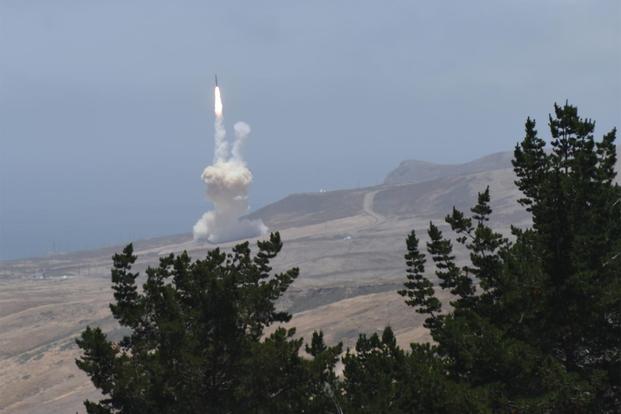The short-term funding bill signed Friday by President Donald Trump includes money for missile defense and fixes for the U.S. Navy destroyers damaged in collisions this summer, but nothing for dozens of new weapons programs proposed for 2018.
Before heading to his estate on Mar-a-Lago in Palm Beach, Florida, the president signed a tax overhaul bill as well as a stopgap spending bill known as a continuing resolution to keep the government running through Jan. 19.
The latter, H.R.1370, will keep funding at current levels for agencies but with the following exemptions for the Pentagon and Veterans Affairs Department:
- $4 billion for missile defense programs at the Pentagon to combat the ballistic missile threat posed by North Korea, including $200 million to build a new missile field in Alaska;
- $2.1 billion for the Veteran Affairs Department's Veterans Choice Program; and
- $674 million for the Navy to repair the Arleigh Burke-class destroyers USS John S. McCain and USS Fitzgerald, both of which were damaged in separate collisions with commercial vessels in the Pacific this summer, resulting in the combined deaths of 17 sailors.
"We are ordering $4 billion worth of missile defense equipment and missiles," Trump said during a bill signing at the White House. "Very important. Top of the line. Best in the world. We make the best military product in the world, and nobody is even close."
The president added, "And so we're ordering $4 billion worth of missile defense, and that will be done by signing right here and also by notifying the Speaker of the House and President of the Senate, designating the missile defense as emergency defense fund. So it's $4 billion for that and $700 million for various other military forms of equipment. And I'm very honored to be doing that. Our military has been doing a fantastic job in so many ways, with ISIS. And everything they're touching lately has been working out. So we're signing that."
North Korea repeatedly rattled the international community this year with a series of ballistic missile launches and nuclear tests that showed major advancements in military technology.
The regime of Kim Jong-un in September conducted an underground test of a thermonuclear weapon, or hydrogen bomb, designed for an intercontinental ballistic missile. The yield for the North's sixth and latest nuclear test was estimated at between 100 kilotons and 300 kilotons -- its largest to date and many times the destructive power of the atomic weapons the U.S. dropped on Japan during World War II.
The regime in November launched an ICBM that flew for 50 minutes and reached an altitude of more than 4,000 kilometers -- the longest and highest flight yet of any such test. The U.S. responded with show-of-force exercises with allies in the region, including South Korea and Japan.
The short-term budget bill, however, does nothing for dozens of new defense acquisition programs or others targeted for increased levels of funding.
While lawmakers passed a defense authorization bill setting policy for fiscal 2018, they were unable to agree on an accompanying spending bill for the Pentagon. Congress is set to resume debate on that issue, including lifting spending caps known as sequestration, after returning from the holiday break on Jan. 3.
-- Brendan McGarry can be reached at brendan.mcgarry@military.com. Follow him on Twitter at @Brendan_McGarry.









